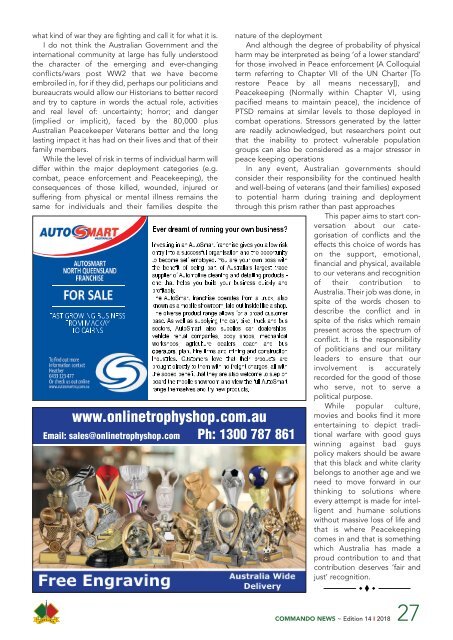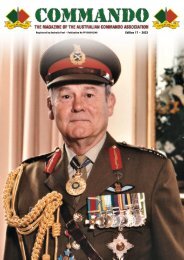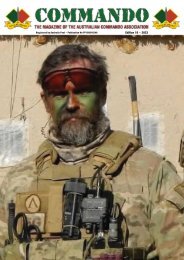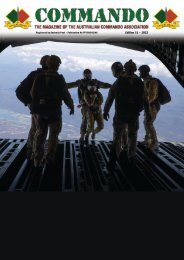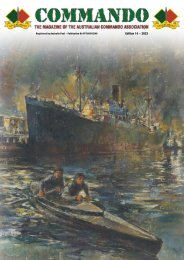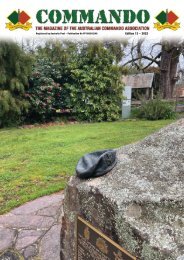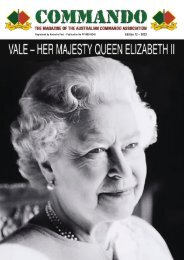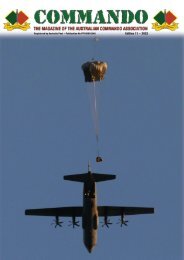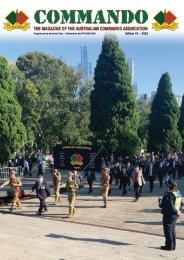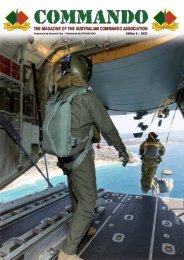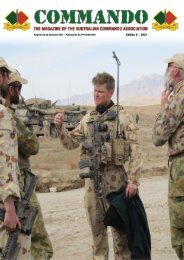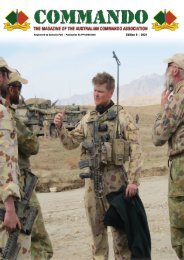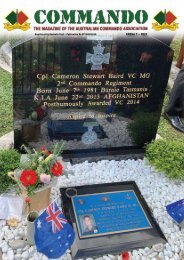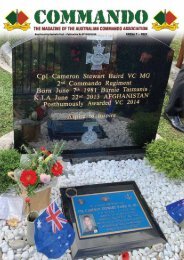You also want an ePaper? Increase the reach of your titles
YUMPU automatically turns print PDFs into web optimized ePapers that Google loves.
what kind of war they are fighting and call it for what it is.<br />
I do not think the <strong>Australia</strong>n Government and the<br />
international community at large has fully understood<br />
the character of the emerging and ever-changing<br />
conflicts/wars post WW2 that we have become<br />
embroiled in, for if they did, perhaps our politicians and<br />
bureaucrats would allow our Historians to better record<br />
and try to capture in words the actual role, activities<br />
and real level of: uncertainty; horror; and danger<br />
(implied or implicit), faced by the 80,000 plus<br />
<strong>Australia</strong>n Peacekeeper Veterans better and the long<br />
lasting impact it has had on their lives and that of their<br />
family members.<br />
While the level of risk in terms of individual harm will<br />
differ within the major deployment categories (e.g.<br />
combat, peace enforcement and Peacekeeping), the<br />
consequences of those killed, wounded, injured or<br />
suffering from physical or mental illness remains the<br />
same for individuals and their families despite the<br />
www.onlinetrophyshop.com.au<br />
Email: sales@onlinetrophyshop.com Ph: 1300 787 861<br />
nature of the deployment<br />
And although the degree of probability of physical<br />
harm may be interpreted as being ‘of a lower standard’<br />
for those involved in Peace enforcement (A Colloquial<br />
term referring to Chapter VII of the UN Charter [To<br />
restore Peace by all means necessary]), and<br />
Peacekeeping (Normally within Chapter VI, using<br />
pacified means to maintain peace), the incidence of<br />
PTSD remains at similar levels to those deployed in<br />
combat operations. Stressors generated by the latter<br />
are readily acknowledged, but researchers point out<br />
that the inability to protect vulnerable population<br />
groups can also be considered as a major stressor in<br />
peace keeping operations<br />
In any event, <strong>Australia</strong>n governments should<br />
consider their responsibility for the continued health<br />
and well-being of veterans (and their families) exposed<br />
to potential harm during training and deployment<br />
through this prism rather than past approaches<br />
This paper aims to start con -<br />
versation about our cate -<br />
gorisation of conflicts and the<br />
effects this choice of words has<br />
on the support, emotional,<br />
financial and physical, available<br />
to our veterans and recognition<br />
of their contribution to<br />
<strong>Australia</strong>. Their job was done, in<br />
spite of the words chosen to<br />
describe the conflict and in<br />
spite of the risks which remain<br />
present across the spectrum of<br />
conflict. It is the responsibility<br />
of politicians and our military<br />
leaders to ensure that our<br />
involvement is accurately<br />
recorded for the good of those<br />
who serve, not to serve a<br />
political purpose.<br />
While popular culture,<br />
movies and books find it more<br />
entertaining to depict tradi -<br />
tional warfare with good guys<br />
winning against bad guys<br />
policy makers should be aware<br />
that this black and white clarity<br />
belongs to another age and we<br />
need to move forward in our<br />
thinking to solutions where<br />
every attempt is made for intel -<br />
ligent and humane solutions<br />
without massive loss of life and<br />
that is where Peacekeeping<br />
comes in and that is something<br />
which <strong>Australia</strong> has made a<br />
proud contribution to and that<br />
contribution deserves ‘fair and<br />
just’ recognition.<br />
COMMANDO NEWS ~ <strong>Edition</strong> <strong>14</strong> I <strong>2018</strong> 27


